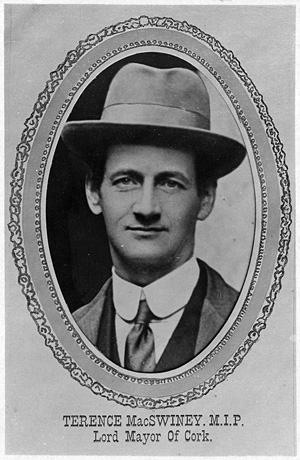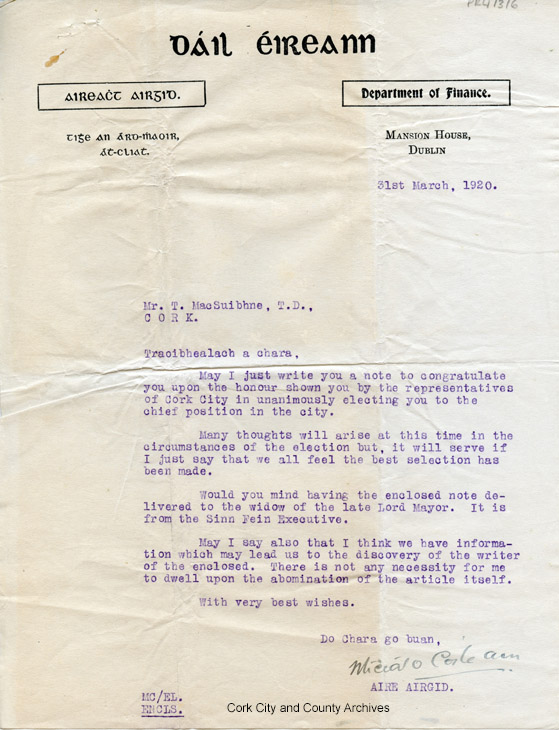View/download/print descriptive list of PR4 Collection
Reference Code: | IE 627/PR4
|
Title: | Lord Mayor Terence MacSwiney 1920 Files
|
Dates: | (1919) March – July 1920
|
Level of description: | Series / Item
|
Extent: | 362 items
|
MacSwiney, Terence (b1879-d1920), Lord Mayor of Cork.
The papers were donated to the Archives by Father Nessan Shaw, Gurranabraher, for Sister Rossario Hall, North Presentation Convent, and Mrs. Marie Collins, nieces of Father Dominic, Chaplain to MacSwiney.
Terence MacSwiney, republican politician and Lord Mayor of Cork, also Commanding Officer of Cork No.1 Brigade, Irish Volunteers / Irish Republican Army. Elected Lord Mayor of Cork following the murder of Lord Mayor Tomás MacCurtain in March 1920. Died on hunger strike at Brixton Prison, London in Oct. 1920. Elected to the First Dáil as TD for the Mid-Cork area.
The collection itself is relatively small yet surprisingly wealthy in information. It consists of 362 documents separated into six individual correspondence files containing incoming and copy outgoing letters in English, Irish and French. Although the collection covers the period from 1919 to 1920 most of the documents concentrate on the period of March to July 1920 and are primarily administrative.
There are however two distinct themes, MacSwiney as Lord Mayor of Cork, and as the Commanding Officer of Cork No.1 Brigade, Irish Volunteers.
The original order has been maintained and the collection divided into six sections each representing an individual file. Within each file the documents have been rearranged to reflect chronological order as this had become disordered. The only file originally named was File 2 labelled 'Finance' which includes correspondence concerning the establishment of an Irish taxation department, the accumulation of revenue from the renewal of licences and the collection of money for the Dáil Éireann Loan in Cork. However these themes are not exclusive to this particular file and neither do they dominate it. This is a common trait in all six files for although they appear to have been kept as separate administrative files by MacSwiney the subject matter throughout the collection continuously overlaps.
The principle correspondents are Diarmuid O'Hegarty, Secretary Dáil Éireann, Austin Stack, Substitute Minister for Home Affairs, Michael Collins, Minister for Finance and Kevin O'Higgins, Substitute Minister for Local Government. To a lesser extent there are also letters from Liam de Róiste, T.D., Desmond Fitzgerald, Director of Propaganda, Arthur Griffith, Acting President Dáil Éireann and Daniel Corkery. In terms of the Irish Volunteer movement Gearóid O'Sullivan, Adjutant General and Richard Mulcahy, Chief of Staff are the main correspondents. Letters are also exchanged with the Commanding Officers of Cork No.3 Brigade, Tom Hales and the 6th Battalion Commandant, T.S. O'Gorbidhe.
The main themes overlapping in the files are the establishment and early workings of the National Arbitration Courts, the separation from English Local Government to Irish Local Government, the foundation of an Irish taxation system and the collection of funds in Mid Cork and Cork City for the Dáil Éireann Loan Fund.
The foundation of a nation-wide regional judicial system is particularly emphasised in MacSwiney's correspondence with Austin Stack, Substitute Minister for Home Affairs. There are a number of requests and reports commenting on the progress of MacSwiney's constituency in setting up Republican Courts (PR4/2/1) and a continuous eagerness to show these courts to American journalists (PR4/4/63). One of the earliest working tests and frequent subject in the papers is the case of R. Power, Tramore, County Waterford whose action highlights the starting difficulties and resolutions of this new system. (PR4/2/3, PR4/6/15).
This eagerness on the part of MacSwiney and his contemporaries is equally apparent in the weight of correspondence regarding the establishment of a financially independent country. MacSwiney, Michael Collins, Minister for Finance and to a lesser extent Liam de Róiste, T.D., converse over the amount of money or gold collected for the Dáil Éireann Loan Fund (PR4/2/2, PR4/5/34). There are also numerous letters between MacSwiney and Collins concerning proposed new methods of taxation, the possibilities of collecting revenue directly from the Irish people and the problems of indemnifying Ireland against liability to the British Government.
Another dominant theme explored in the files are the many difficulties arising out of the break with English Local Authorities. There are a number of reports concerning inquiries into the state of Local Government in Ireland and the financial and legal problems that separation from England would entail (PR4/4/16). To protect the continued existence of County Councils, Sinn Féin members were asked to sign resignation forms in advance and much of MacSwiney's correspondence with Kevin O'Higgins, Substitute Minister for Local Government, is concerned with this procedure and MacSwiney's own efforts to have the Government appoint a 'locum tenens' to take the place of the "resigned" councillor. (PR4/3/14, PR4/6/76).
The final principle correspondent is Diarmuid O'Hegarty, who in his capacity as Dáil Éireann Secretary, frequently wrote to MacSwiney regarding arrangements for meetings, safe addresses for correspondence and MacSwiney's inspection of Limerick Technical School. Other general correspondence with MacSwiney concerns letters of sympathy with Volunteers who had been imprisoned (PR4/6/82), requests for employment (PR4/6/45) and sponsorship (PR4/6/70) and Cork Corporation's support for both the Resolution of Allegiance to Dáil Éireann (PR4/5/1)and the resolution supporting the beatification of Oliver Plunkett (PR4/6/12).
Another matter which generates a significant amount of material is the death and murder of Tomás MacCurtain, Lord Mayor of Cork. This includes MacSwiney's own acceptance speech as Lord Mayor of Cork (PR4/1/1), Cork Corporation's resolution condemning the murder of MacCurtain (PR4/5/18) and the very many letters from MacSwiney regarding subscriptions to the MacCurtain Memorial Fund (PR4/5/95, PR4/6/89).
Material on the Irish Volunteers centres on General Orders, reports of raids, Royal Irish Constabulary membership, and inquiries into breaches of discipline. The General Orders concern Volunteer conduct, seizure of arms, rules of correspondence and the establishment of a voluntary police force. There are several reports of successful attacks to Richard Mulcahy, Chief of Staff (PR4/4/50) and a number of letters from MacSwiney dealing with complaints of ill-treatment and unauthorised action particularly the looting of Ballyvourney Woods (PR4/2/18, PR4/4/48). Another strong theme is the enforcement of the R.I.C. boycott and the problems associated with the precise nature of this boycott and its effects on trade (PR4/4/92, PR4/5/43). There are also a limited number of editions of An Toglach, An Saorstat and Misneach.
The file contents are in a good state of preservation and very legible. The size of the collection allows for an individual description of each item and those written in Irish or French have been translated.
The original order has been maintained. The collection is divided into six sections each representing an individual file. Within each file the documents have been rearranged to reflect chronological order as this had become disordered.

